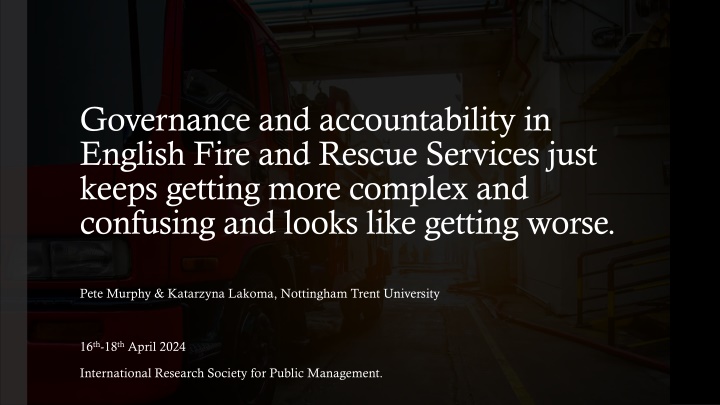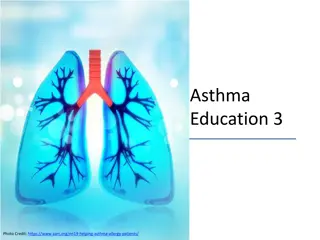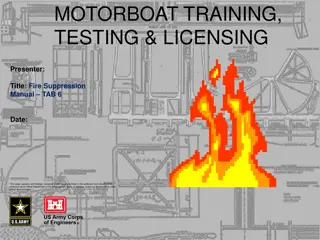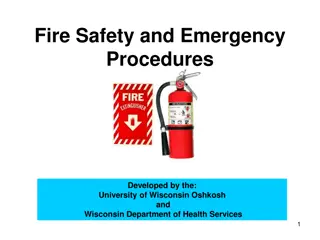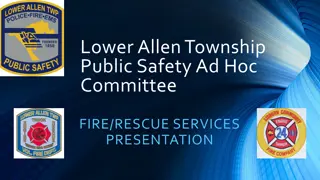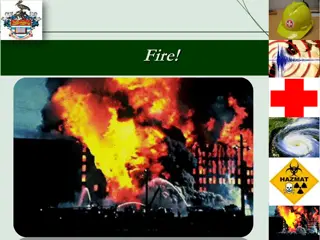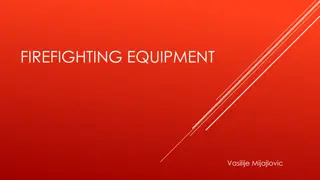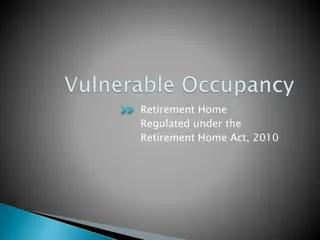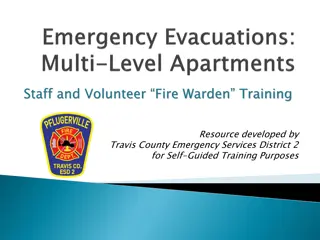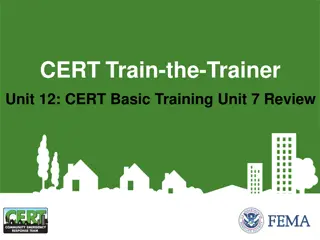Complexity in Governance and Accountability of English Fire and Rescue Services
Fire and Rescue Services governance and accountability issues in England have become increasingly complex and confusing, posing challenges to reform efforts based on traditional principles. Research explores the concept of wicked issues and suggests a new approach rooted in New Public Governance principles.
Download Presentation

Please find below an Image/Link to download the presentation.
The content on the website is provided AS IS for your information and personal use only. It may not be sold, licensed, or shared on other websites without obtaining consent from the author.If you encounter any issues during the download, it is possible that the publisher has removed the file from their server.
You are allowed to download the files provided on this website for personal or commercial use, subject to the condition that they are used lawfully. All files are the property of their respective owners.
The content on the website is provided AS IS for your information and personal use only. It may not be sold, licensed, or shared on other websites without obtaining consent from the author.
E N D
Presentation Transcript
Governance and accountability in English Fire and Rescue Services just keeps getting more complex and confusing and looks like getting worse. Pete Murphy & Katarzyna Lakoma, Nottingham Trent University 16th-18thApril 2024 International Research Society for Public Management.
15/03/2025 Research Problem and Approach Fire and Rescue Services governance, accountability and assurance issues have become akin to a wicked issue for a government fixated on a reform agenda based upon NPM principles that have repeatedly proven to be ineffective. We suggest that governance and accountability issues in the Fire and Rescue Services need to be addressed through a new approach based upon New Public Governance principles (NPG) Our research is essentially exploratory research using publicly available information, archival sources and data. 2
Is it really a Wicked issue? Issues ill-defined and never solved (Rittel &Webber, 1973), complex, unpredictable, open ended, or intractable (Head & Alford, 2015), which arise from deep- rooted policy debates on tackling significant problems, which seem resistant to various solutions. Proposed strategies generally tend to focus on deliberation and problem solving among a group of stakeholders at multiple levels (Head & Alford, 2015). Changing public sector management and governance structures have been adding to the difficulty of tackling already complex issues 2
Public management reforms Traditional Public Administration NPM Hierarchical model of bureaucracy (Wilson, 1887) NPG Performance through target setting and measurement (Dunleavy and Hood, 1994) Working with wide-ranging stakeholders to create value (Osborne, 2006) 4
Public management reforms and wicked issues Traditional Public Administration NPM Hierarchical model of bureaucracy (Wilson, 1887) NPG Performance through target setting and measurement (Dunleavy and Hood, 1994) Working with wide-ranging stakeholders to create value (Osborne, 2006) 5
Research context Since the beginning of the 21st century, English Fire and Rescue Services have experienced reforms of the governance and accountability which have been repeatedly criticized as being inadequate (Audit Commission, 2008, NAO 2015, PAC 2016, Home Office 2022). arrangements, For the past 15 years, Fire and Rescue Services in the UK have operated under separate administrative arrangements in England, Wales, Scotland, and Northern Ireland, although all are subject to long-term austerity policies. legislative and 6
Research methods We examine the UK government reforms and in particular the performance management regime and the financial regime for English Fire and Rescue Services between 1997- 2010 (Labour governments) (Conservative-led governments) and 2010-2023 We draw upon UK government legislation, ministerial statements, parliamentary committee reports, audit inspection reports, and documents to determine which type of public management reforms best addresses the governance and accountability issues within English Fire and Rescue Services. other publicly available 7
The governance and performance management regime (1997 to 2010) Key performance indicators published annually by the Audit Commission from mid-1995. External Audit and Inspection expanded and innovated Local government modernisation and then improvement agendas (Best Value, co-creation, joined up working, community strategies, Local Strategic Partnerships). From 2005, performance management regimes embraced NPG and Public Value in revised Comprehensive Performance Assessments (followed by Local Area Agreements (2007) Comprehensive Area Assessments (2009); and Multiple Area Agreements (2009). 7
Governance and performance management regime in the Fire Sector (1997 to 2010) Fire Sector had a bespoke performance assessment regime and a series of National Frameworks for policy and delivery (2004a, 2004b, 2006; 2008). These were based upon assessment of risk to people and communities, as well as risks to buildings and premises. By 2009/10, the emphasis was firmly on co-production, innovation, improvement, creating public/social value, and involving multiple collaborations, partnerships, networks and other NPG and Public Value traits (Morphet, 2008; Murphy, 2014). 8
The governance and performance management regime (2010 to 2023) A radical change in public policy based on austerity localism (Lowndes & Pratchett, 2011) and sector-led improvement (LGA, 2011) Devolution. Scotland and Wales continuing with co-production, innovation, improvement, multiple collaborations, partnerships, networks. National Framework 2012 embracing NPM service configuration based on demand rather than risk, commissioner/provider split (FRA/FRS), marketisation, outsourcing (Cabinet Office 2011, 2012) Accountability, transparency, and service delivery were poorer in 2015 than in 2010. Independent external inspections were abandoned between 2010 until 2017 (NAO 2015, PAC 2016, May 2016) 9
Governance and performance management regime in Fire Sector (2017 to 2023) The re-creation of an external inspectorate (HMICFRS) and a Standards Board, together with calls for a better evidence base. A statutory requirement for greater collaboration A new directly elected governance model, based on the police model, to improve accountability, transparency and governance HMICFRS values include a commitment to creating Public Value and a return to primacy of the assessment of risk. However, repeated calls for further reforms of Fire and Rescue Services at both national and local levels (Home Office 2022) 10
The Financial Management Regime (1997-2010) Financial compliance was overseen by the Audit Commission. It produced national KPIs from mid-1995. In 2002, CPA built on KPIs and produced annual Use of Resources Assessments about how LAs managed their assets to facilitate achieving best value and continuous improvement as measured by their economy, efficiency, and effectiveness The Use of Resource assessments, consisted of five assessments (Financial Reporting, Financial Management, Financial Standing, Internal Control and Value for Money) and measured short, medium and long-term performance, both retrospective and prospective (financial resilience). 11
The Financial Management Regime (2010-2023) The Audit Commission was abolished, which transferred local audit to private audit firms Transformed local audit through the NPM mechanisms of outsourcing, fragmentation and reduced levels of public oversight and knowledge of risks (Ferry & Eckersley, 2022) A system of sector-led improvement for financial management The National Audit Office reporting to central government a key report into value for money and financial sustainability in Fire and Rescue Services (NAO, 2015). Redmond (2019, 2020) acknowledged inadequacies in local public audit and in the financial system following LAAA 2014 12
Discussion and Conclusions Is governance and accountability in English Fire and Rescue Services becoming an increasingly wicked issue for the government or just a political blind spot for the current administration? Investigating FRS under the Labour administrations (1997 to 2010) and the Conservative-Led administrations (2010 to 2023) shows that both administrations initially attempted to adopt and impose NPM reforms, but these proved inadequate. An accumulation of evidence and changing circumstances meant that successive governments in both periods gradually adopted approaches, tools, and techniques more associated with NPG, the former enthusiastically the latter extremely grudgingly. As a result, of this move accountability and transparency were better understood and enhanced, facilitated by a more robust evidence base. 13
Discussion and Conclusions (contd) In 2010, the new Coalition Government radically changed back to a NPM approach, while the devolved administrations effectively maintained the previous Westminster Governments direction of travel towards NPG By 2015, the governance and accountability of Fire and Rescue Services were displaying many of the characteristics of a wicked policy issue (Head 2022). However, the governance and accountability of English (and international) Fire and Rescue Services is not a wicked issue, it is just a political blind spot for a government that has lost its way, besotted by NPM and a neo-liberalist approaches to the economy and to public services.. We suggest that governance and accountability issues in Fire and Rescue Services need to be addressed through initiatives previously articulated and discussed in the NPG and wicked issues literature. 14
Thank you Questions? 15
